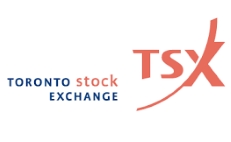Trader’s Guide to the Toronto Stock Exchange
Sometimes shortened to TSX, the Toronto Stock Exchange is based in Toronto in Canada, and is one of the biggest stock exchanges in the world. By market capitalisation it is ninth biggest in the world, and it is operated and owned by the TMX group as one of its subsidiaries for the purpose of senior equities trading. The TMX Group is an exchange group that operates and owns numerous trading business throughout Canada, and through its several subsidiaries it operates cash, derivative, equity and energy trading facilities as well as other financial services such as clearing facilities and data products. With its headquarters in Toronto, the TMX Group also has offices spread throughout the country. The Toronto Stock Exchange represents a broad spectrum of businesses, both domestic and international. As well as listing traditional securities, there are split-share corporations, exchange-traded funds, investment funds, derivatives, futures, options, bonds, commodities and income trusts also listed on the exchange. One feature that makes the TSX stand apart from other stock exchanges is that there are more oil, gas and mining companies listed on it than on any other. Overall, there are more than 1,500 listings on the TSX, with the securities being denominated in Canadian Dollars.
All trading carried out on the Toronto Stock Exchange is executed entirely electronically, which has been the case since 1997 when the exchange closed its trading floor, which is similar to the case with the NASDAQ exchange in America. The TSX’s normal trading session takes place on weekdays between 9:30 am and 4:00 pm ET, with a post-market session being held between 4:15 pm and 5:00 pm ET. The TSX is closed for trading on Saturdays, Sundays and on any holiday that has been declared in advance by the Exchange. The main index of the Toronto Stock Exchange is the S&P/TSX Composite Index, which is an index of the equity prices of the biggest companies listed on the TSX measured by their market capitalisation. As the Canadian stock market’s headline index, the S&P/TSX Composite is one of the most commonly watched indices in the world, and acts as a barometer for the health of the Canadian economy, as it measures the performance of stocks representing 10 different business sectors in the country, including consumer staples, consumer discretionary, energy, healthcare, financials, industrials, information technology, materials, IT, utilities and telecommunications.
| Broker | Bonus | More |
|---|
A Brief History of the Toronto Stock Exchange

The TSX introduced its Computer Assisted Trading System (CATS) in 1977, an automated system that was used for quotations on less-liquid equities. The Toronto Stock Exchange relocated into the Exchange Tower in 1983, and a major step towards modern-style trading took place in 1997 when its trading floor closed in order to make the exchange the second-biggest in North America to opt for an electronic, floorless virtual trading environment. The Toronto Stock Exchange became the sole exchange in Canada for senior equities trading through a realignment plan, with the Montreal Exchange assuming responsibility for derivatives trading, and a merger of the Alberta Stock Exchange and the Vancouver Stock Exchange into the Canadian Venture Exchange taking over the trading of junior equities. The Toronto Stock Exchange became a for-profit company in 2000, and 1 year later, its code was altered to TSX instead of TSE. The Canadian Venture Exchange was acquired by the Toronto Stock Exchange in the same year, and it was renamed the TSX Venture Exchange in 2002, with the parent TSX Group being created as a result.
The main index of the Toronto Stock Exchange, the S&P/TSX Composite index, traded over the 14,000 point level for the first time in 2007, and in 2008, the exchange was closed down for a full trading day for the first time in its history due to technical problems. Although there were discussions about a merger of the TMX Group with the London Stock Exchange in 2011, this never came to pass due to lack of shareholder approval.
The Companies Listed on the Toronto Stock Exchange
There are around 1,500 companies listed on the Toronto Stock Exchange from seven different sectors:
- Clean technology
- Energy
- Mining
- Technology
- Diversified industries
- Life sciences
- Real estate
The Toronto Stock Exchange is also home to all of Canada’s five main commercial banks: the Bank of Montreal, the Canadian Imperial Bank of Commerce, the Bank of Nova Scotia, the Toronto Dominion Bank, and the Royal Bank of Canada; and this makes the exchange the country’s centre for banking. Some of the best-known companies that list on the TSX include the following:
- Royal Bank of Canada
- Toronto Dominion Bank
- Valent Pharmaceuticals International
- Bank of Nova Scotia
- Canadian National Railway Company
- General Motors Company
- Suncor Energy
The TSX Venture Exchange, or TSX-V, holds listings for over 2,000 companies that are considered to be too small to list on the main TSX.
Other educational materials
- Japanese Exchange Group (JPX)
- LSE – London Stock Exchange
- NASDAQ
- CAC 40 Index
- Dow Jones Industrial Average
- Euronext
Recommended further readings
- Do analysts generate trade for their firms? Evidence from the Toronto stock exchange. Irvine PJ. Journal of Accounting and Economics. 2000 Oct 31;30(2):209-26.
- Decimalization and competition among stock markets: Evidence from the Toronto Stock Exchange cross-listed securities. Ahn HJ, Cao CQ, Choe H. Journal of Financial Markets. 1998 Apr 30;1(1):51-87.


